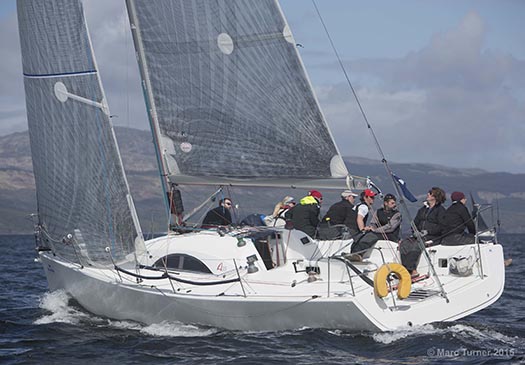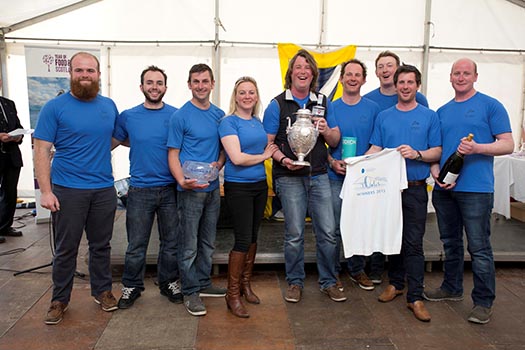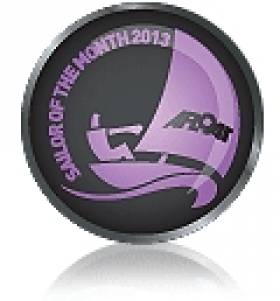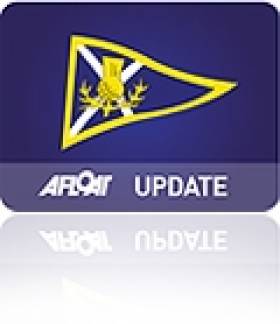Displaying items by tag: Rob McConnell
Rob McConnell is Sailor of the Month for May
#som – May 2015 has been a good month for Dunmore East, with the confirmation that the long-awaited dredging of this pretty fishing/sailing port – a €6 million contract – will swing into action in June, and then from far-off Scotland came the news that one of Waterford Harbour Sailing Club's most popular and enthusiastic skippers had emerged as overall winner of the Silvers Scottish Series 2015.
Rob McConnell is well-known at all Ireland's main sailing centres, as he campaigns his A35 Fool's Gold with targeted campaigns of skill - coupled with sheer joy in sailing - in any event which can be fitted into a busy schedule. Crewed by friends who may be from all parts of Ireland but undoubtedly have a Dunmore East emphasis, he can be relied on to be always in the frame on the leaderboard, and in line with this approach, The Scottish Series was regarded as unfinished business after Fool's Gold finished second overall in 2014.
This time round, racing in the biggest class of all, things were looking good from the start. But such was the competition that it wasn't until after the final race on the three-race concluding day that the WHSC boat could be confirmed as overall winner, and a worthy provider of the Afloat.ie "Sailor of the Month" for May 2015.
#scottishseries – On form Waterford Harbour Yacht, 'Fools Gold' skippered by Rob McConnell, is toasting Scottish Series success in Tarbert tonight after taking overall victory in IRC class two and the overall Scottish Series title for best performance. The McConnell crew returned to Tarbert with some unfinished business on Loch Fyne having finished second in 2014. McConnell's A35 design was the overnight leader on the Clyde event but still had to complete the series and sail three more races in the 11–race regatta today. The Dunmore East crew finished on a race win this afternoon – more than enough to give victory – some nine points clear of British runner up Sloop John T. Third was former ICRA champion Pat Kelly's Storm from Howth. The National Yacht Club's J109 Something Else sailed by Brian and John Hall was fourth. Results are downloadable below. Fools Gold returns to Irish waters to compete offshore in June's Dun Laoghaire to Dingle Race.
After four days, 11 races and some of the best sailing in Scotland, the crew certainly had the luck of the Irish taking the overall title, along with winning IRC Class 2. Race organisers awarded the coveted trophy to Fools Gold based on the best performance in the tightest class. And that's not all, the Waterford Harbour Sailing team received the Crawford McInnes Trophy sponsored by Hempel Paints for the best under 25 helm. They also take home the trophy for the best IRC class boat.
While Silvers Marine Scottish Series main sponsor Jamie McGarry may be disappointed to see the trophy go over the water to Ireland, you can be sure both he and Colin Moore will be back to fight for it again next year. Jamie, who has just announced Silvers Marine will sponsor the regatta again next year, praised the race officers Stuart Childerley, John Readman and Alan Cassels for their smooth management of the regatta. The race teams on both courses were excellent and it is testament to them that all races were sailed and none cancelled.
In IRC Class 1 it was Steven Cowie's Zephyr who came out on top. This was a hotly contested class all weekend and Jamie McGarry and Colin Moore's Eala of Rhu, who had been lying in third place overnight, had an outstanding final day. However, it was Zephyr who claimed the victory and it was wonderful to see Scotland's three Commodore's Cup team boats ending the regatta in the top three places, with Rod Stuart and William Ram's Aurora taking the final podium position.

Fools Gold on her way to overall victory in the Scottish Series and below her crew at the prizegiving last night in Tarbert. Photos: Marc Turner

Waterford winners in Scotland: Brian O Donnell (mast) Steve McConnell (Bow man), Roy Darrer (helm), Marcella Connolly (mid bow), Rob Mc Connell (skipper / main trimmer), Graham Curran (trimmer one), Aaron Power (trimmer two), Paul Cotter (navigator) and Damian Purcell (pit man).
In IRC Class 2, and there was just one point in it as overall champions Fools Gold stayed ahead of Sloop John T and Storm who both finished on 28 points.
Over in IRC Class 4 and Craig Latimer who has battled all week, settled for a single point victory over Trastada with Irish hopefuls Lambay Rules coming in in third on 22 points. Craig won this class last year in his previous boat Wildebeest IV and will be delighted to have snatched victory again this year.
CYCA 5 This class was dominated by Geoff and Norman Howison in their new boat Local Hero. Consistent sailing by Enigma saw them in second and a great regatta for Ian McNair in First By Farr saw the crew clinch third.
CYCA 6 and the veteran Valhalla of Ashton who has competed in every Scottish Series tops the table again this year. She looked strong all weekend and was followed home by She of the North and Garth Wilson's Zebedee who took a very credible third.
CYCA 8 Restricted Sail. It was all change in the top two with Windhound pulling out an ace in the last day to beat Jochr with Eureka IV taking third.
CYCA 9 Restricted Sail – well done to Halcyon who had a comfortable win over Lyrebird with Poppy in third.
Sigma 33 Series has had tight racing across the regatta but on the final day Bradshaw and Gallagher did what was needed to stay ahead of Leaky Roof 2 and Donald McLaren's Sigmatic which took the third spot.
National Sonata One Design and Steve Goacher's Eric the Boat dominated this class all weekend. However Old School had a great regatta to end up a credible second with White Magic in third. Sadly, this class saw last year's winner Murray Caldwell in Red Hot Poker have to withdraw on day one of the event with a broken rig.
VX One, this class had some tight racing but Ovington Boats held their nerve to finish ahead of Robbers Dog and Zhik.
J70 Iain Aitken in boats.com dominated this class with straight firsts across the regatta. He was followed home by Jacuzzi and Django to win the Scottish Championship.
Hunter 707 More T Vicar stayed one point clear of Rammie to take the class ahead of Black Sheep in third.
Results
IRC Class 1
1. Eala of Rhu, J McGarry and C Moore; 2. Zephyr, S Cowie; 3. Aurora, R Stuart and W Ram
IRC Class 2
2. Fools Gold, R McConnell; 2. Sloop John T, I and G Thomson; 3. Storm, P Kelly
IRC Class 4
1. Wildebeest V, C Latimer; 2. Trastada, R Angus / D Challis; 3. Lambay Rules, S Quinn
CYCA Class 5
1. Local Hero G and N Howison; 2. Enigma, M and H Morrison; 3. First By Farr, I McNair
CYCA Class 6
1. Valhalla of Ashton, A Dunnet; 2. She of the North, K Halliwell; 3. Zebedee, G Wilson
CYCA Class 8 Restricted Sail
1. Windhound, D Macnab; 2. Jochr, Owen Mcmanus; 3. Eureka IV, C Frier
CYCA Class 9 Restricted Sail
1. Halcyon, S Owen; 2. Lyrebird, C Reeves; 3 Poppy, J Roberts
Sigma 33 Class
1. Busy Beaver, J Gallagher and M Bradshaw; 2. Leaky Roof 2, Harper and Robinson, 3. Sigmatic, D and A McLaren
National Sonata One Design
1. Eric the Boat, S Goacher; 2. Old School, McNeish, Galbraith, Chas; 3. White Magic, D Matthews
VX One Series
1. Ovington Boats, M Darrer; 2. Robbers Dog, J and B Shelley; 3. Zhik, D Heppelwhite
J70 Series
1. boats.com, I Aitkens; 2. Jacuzzi, P Hayes and S Hawthorn; 3. Django, C R Haworth
Hunter 707
1. More T Vicar, C Allen; 2. Rammie, M Fleming / D Smith; 3. Black Sheep, T Clark / S Parker

























































